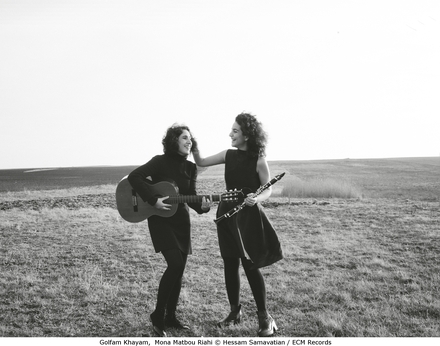Narrante is the work of two Tehran-born female musicians, guitarist Golfam Khayam and clarinettist Mona Matbou Riahi who perform under the name Naqsh Duo. Replete with Persian mystery, the album is essential listening.
Naqsh Duo depend very much on the intimate musical conversation that binds both players to the job in hand. The record is a deft mixture of improvisation and composition - apparently the composed bits may wrong foot you by sounding improvised. Khayam, a contemporary classical music specialist, has acknowledged Coltrane and Jarrett from whom she learned that composer and performer need not be separate entities. Riahi has namechecked Nina Simone, Billie Holiday and Charlie Parker. Both, however, are keen students of Persian music, without which all their Western influences would be as nought.
The music is replete with mystery, and its opaqueness acts like a magnet. You may find yourself returning to its secret wells of sound, hoping vainly to crack the secrets of their deeps. Given that there are only two instruments, there is a conscious attempt to display different capabilities or voices with careful attention to silence and pacing. The clarinet sounds like the Armenian duduk on the track Sospiro, while the guitar strings sound suddenly burst out in a harp-like flourish at another point. The longest track, Battaglia - 9 minutes 43 seconds - experiments with string-slapping while the clarinet is made to wail and bend.
There is a sense of somnambulant drift as the tracks lead one to the other in quiet elision, a resigned and stately flow. It can be assumed that the musicians are trying to achieve a certain meditative calm, yet there are layers in the music that make it seductively obscure and troubled, obviously enough in the final track, Lamento-Furioso. Needless to say, that occasional air of languor and repose is achieved by sharp concentration and focus on the parts of the players.
Khayam explains that the album “has an invisible or discreet string running through it, which sews the tracks together.” Yet each track has its own particular source, amounting to “a very personal glance at the roots of Persian music.” Narrante is a fine and subtle record which will repay constant listening.
Paddy Kehoe














